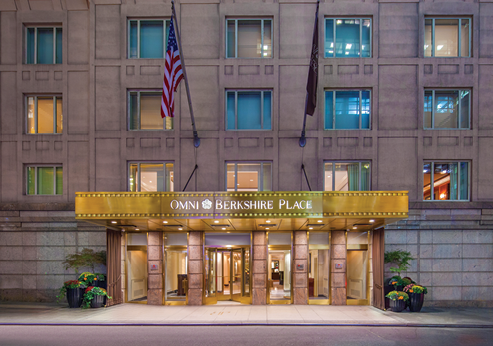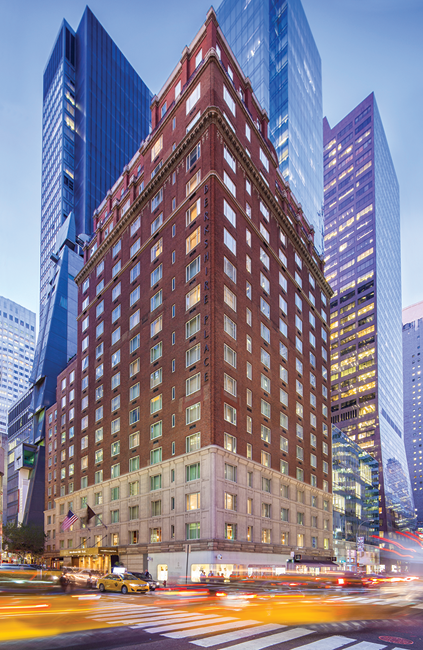- Home
- Media Kit
- Current Issue
- Past Issues
- Ad Specs-Submission
- Ad Print Settings
- Reprints (PDF)
- Photo Specifications (PDF)
- Contact Us

![]()
ONLINE

Defining Luxury
Editors’ Note
David Chase has worked in the hospitality industry for more than 30 years, beginning his career at The Ritz-Carlton San Francisco. After relocating back to the East Coast and working in Boston, he settled in New York to open the first W Hotel in New York City. Chase has held management positions at prestigious hotels including The St. Regis and The Ritz-Carlton, and served as General Manager of Trump SoHo and The New York Palace.
Property Brief
Conveniently located on 52nd Street between Madison and 5th Avenue in the heart of Manhattan, Omni Berkshire Place (omnihotels.com) is near Central Park, Times Square, Rockefeller Center and Radio City Music Hall. Guestrooms and suites were designed with the feel of an Upper East Side residential townhome, while keeping them spacious and larger than most Manhattan accommodations. The property boasts 398 luxury guestrooms including 45 suites; a 17th floor terrace sundeck overlooking midtown Manhattan; 24-hour in-room dining; a state-of-the-art fitness center; 6,000 square feet of function space and a 24-hour business center.

Omni Berkshire Place entrance
What are the strengths of the Omni brand?
Omni has a very unique loyalty program, Select Guest, which is not points based. We offer stays based on numbers of stays, but unlike points where it is dollars for points and certain hotels cost different points to redeem, a guest can earn free nights by staying at our New Haven hotel but then use those nights at our New York City property. The loyalty program includes a beverage delivered to your room every morning. People love free coffee, but they really love free coffee left at your door. Our Select Guest program focus is more experiential which provides us a lot of repeat guests.
When you assumed this role, your priority was on building the team. How critical has it been for you to attract and retain the right talent at the property?
It was job one for me. We became very stabilized within the first 12 months of me getting here. The executive team now has an average tenure of over three years, so we have greatly stabilized the team, and we have done this at all levels of the organization.
How important is it to have a strong suite offering in a city like New York?
In a luxury hotel like ours at this prime location, there are certain guests who come for extended leisure stays of three or four nights rather than a quick business stay. It means a lot to them to have a separate parlor and extra space. We have recently renovated our premier suites and we plan a full room renovation in the next 12 to 18 months.
How much of a focus are meetings and events for Omni Berkshire Place?
It is interesting because the industry is evolving in this area. We have relatively limited space – 5,000-6,000 square feet. We have many of our group clients who hold meetings here and they find it nice that once they have 40 to 60 people with some breakout rooms, they pretty much own our space. That is really one of the wonderful offerings of Omni Berkshire Place because you can be the main focus in-house. In the industry, we’re all getting hurt by the likes of Convene and other players.

Fifth Avenue Suite
How do you define a true luxury hotel experience today?
It is all about personalization. When I worked for Ritz-Carlton many years ago, we use to think that we could tell people what luxury was by saying here is what you want, it’s luxury. We have all now figured out in the business that what John Doe wants is completely different from what Jane Doe wants. Personalization is at the heart of luxury today.
How important has it been for you in this role to have owners with a long-term focus and commitment to the property?
This is one the greatest ownership structures in the business. The owner owns the building and owns the brand. There aren’t conflicting parties who have different priorities, an owner who may want a certain profit in a certain way and a brand trying to keep certain brand standards, so they’re at odds with each other. In our case, it is the same people that we’re serving. This is by far the most collaborative organization I’ve ever worked for.

Omni Berkshire Place exterior
What has made the hospitality industry so special for you?
I often think about what I do for a living and say that I have an office but I don’t work in an office. I work in a building, I spend time in the public space of the hotel, in the back of the house, and everywhere else in the building. I have the opportunity to inspire and motivate people to really give their hearts to the guests every time. That is what I love about this business.
What advice do you offer the next generation of leaders coming into the industry?
I’m a person who didn’t study hospitality. I started as a pot washer while in college, and then a student cook, and then a bus boy at TGI Fridays, and then a server in a Marriott restaurant. The fact that I became a general manager shows that you learn everything being inside the hotel. It is obviously a positive to go to hotel school because you learn the P&L, owner goals, and get a better understanding of the overall business in the early days.
When I look at the students coming from hospitality schools, it’s the ones that have had the dedication to do relevant internships every single summer and have real experience who impress me.![]()